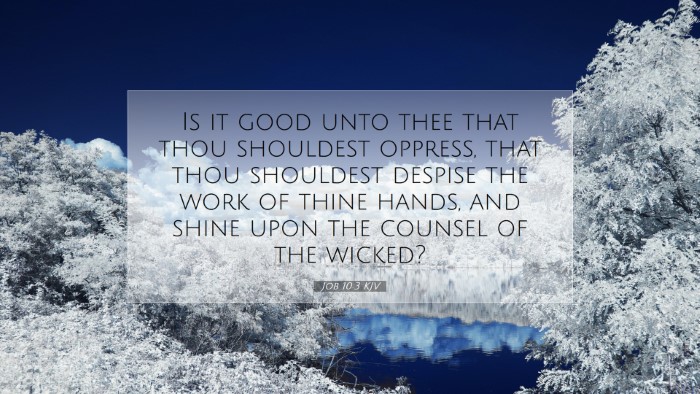Old Testament
Genesis Exodus Leviticus Numbers Deuteronomy Joshua Judges Ruth 1 Samuel 2 Samuel 1 Kings 2 Kings 1 Chronicles 2 Chronicles Ezra Nehemiah Esther Job Psalms Proverbs Ecclesiastes Song of Solomon Isaiah Jeremiah Lamentations Ezekiel Daniel Hosea Joel Amos Obadiah Jonah Micah Nahum Habakkuk Zephaniah Haggai Zechariah MalachiJob 10:3
Job 10:3 KJV
Is it good unto thee that thou shouldest oppress, that thou shouldest despise the work of thine hands, and shine upon the counsel of the wicked?
Job 10:3 Bible Commentary
Commentary on Job 10:3
Verse Reference: Job 10:3 - "Is it good unto Thee that Thou shouldest oppress, that Thou shouldest despise the work of Thy hands, and shine upon the counsel of the wicked?"
Introduction
The Book of Job is a profound exploration of suffering, faith, and the nature of God’s justice. In this verse, Job is expressing his anguish and questioning God's treatment of him, which provides a critical insight into the human condition when faced with suffering. The insights from Matthew Henry, Albert Barnes, and Adam Clarke reveal the theological and philosophical depths of this inquiry.
Contextual Background
Job, a righteous man blessed by God, suddenly finds himself in the throes of unparalleled suffering. His friends offer limited comfort, asserting that his tragedies must stem from hidden sins. In this chapter, Job appeals directly to God, articulating his distress and seeking understanding of his plight.
Matthew Henry's Insights
Matthew Henry emphasizes the deep emotional and spiritual turmoil present in Job’s questioning. He notes the following key points:
- The Question of Justice: Henry points out that Job’s question is fundamentally about the justice of God. He cannot reconcile his afflictions with the character of a just and loving God.
- Confronting God: Job's direct appeal reflects a boldness in addressing God, illustrating that honest confrontation with God in prayer is a vital aspect of faith.
- The Sovereignty of God: Henry explains that Job acknowledges God's sovereignty while simultaneously questioning His actions. This dual acknowledgment is a hallmark of deep theological reflection.
Albert Barnes' Commentary
Albert Barnes provides an exegetical analysis focusing on the implications of Job’s questioning the divine will:
- Oppression and Despise: Barnes elucidates that Job feels he is being treated unjustly, suggesting that God’s oppressive actions do not reflect His omnibenevolence.
- The Work of Thy Hands: Barnes reflects on the idea that Job sees himself as God's creation, thus questioning the logic of being treated as worthless or despised.
- The Wicked: The contrast Job draws between his suffering and the prosperity of the wicked is a poignant theme in the text, highlighting the perplexity of divine justice.
Adam Clarke's Analysis
Adam Clarke approaches the verse with an emphasis on the personal experience of suffering:
- Human Experience: Clarke emphasizes the universal nature of Job's sufferings, urging readers to relate their own pain to Job’s existential cry.
- God’s Purpose: Clarke queries the overarching purposes of God in allowing suffering, noting that while Job is confused, he is still seeking understanding from the Divine.
- Hope and Despair: Although Job's words reflect a moment of despair, Clarke suggests that they also embody an underlying hope for reconciliation and understanding with God.
Theological Reflections
Job 10:3 serves as a crucial passage that opens up several important theological discussions:
- The Nature of God: It forces readers to confront the nature of God as just and loving, even amid suffering. How do we reconcile the existence of evil and suffering with a good God?
- The Role of Human Suffering: The verse compels believers to contemplate the purpose of human suffering and the mystery of divine providence in the lives of the faithful.
- Prayer and Lament: Job sets a precedent for the importance of lament in prayer life, emphasizing that questioning God is permissible and part of a genuine relationship with Him.
Application for Today
This verse and its commentaries hold poignant lessons for modern believers, students of theology, and pastors:
- Encouragement in Suffering: For those in suffering, Job's candor provides encouragement that it is okay to express grievances to God.
- Understanding Divine Justice: This passage invites deeper exploration of our concepts of justice, helping believers form a more nuanced understanding of God’s ways.
- Engaging with God: Readers are encouraged to engage in honest dialogue with God, as exemplified by Job, highlighting that faith is not devoid of questioning.
Conclusion
Job 10:3 encapsulates the profound struggle between faith and doubt, justice and suffering. Through the insights of Henry, Barnes, and Clarke, we find a multifaceted understanding of this text. They encourage us to navigate our frustrations and questions with God while holding onto hope in His ultimate justice and goodness.


